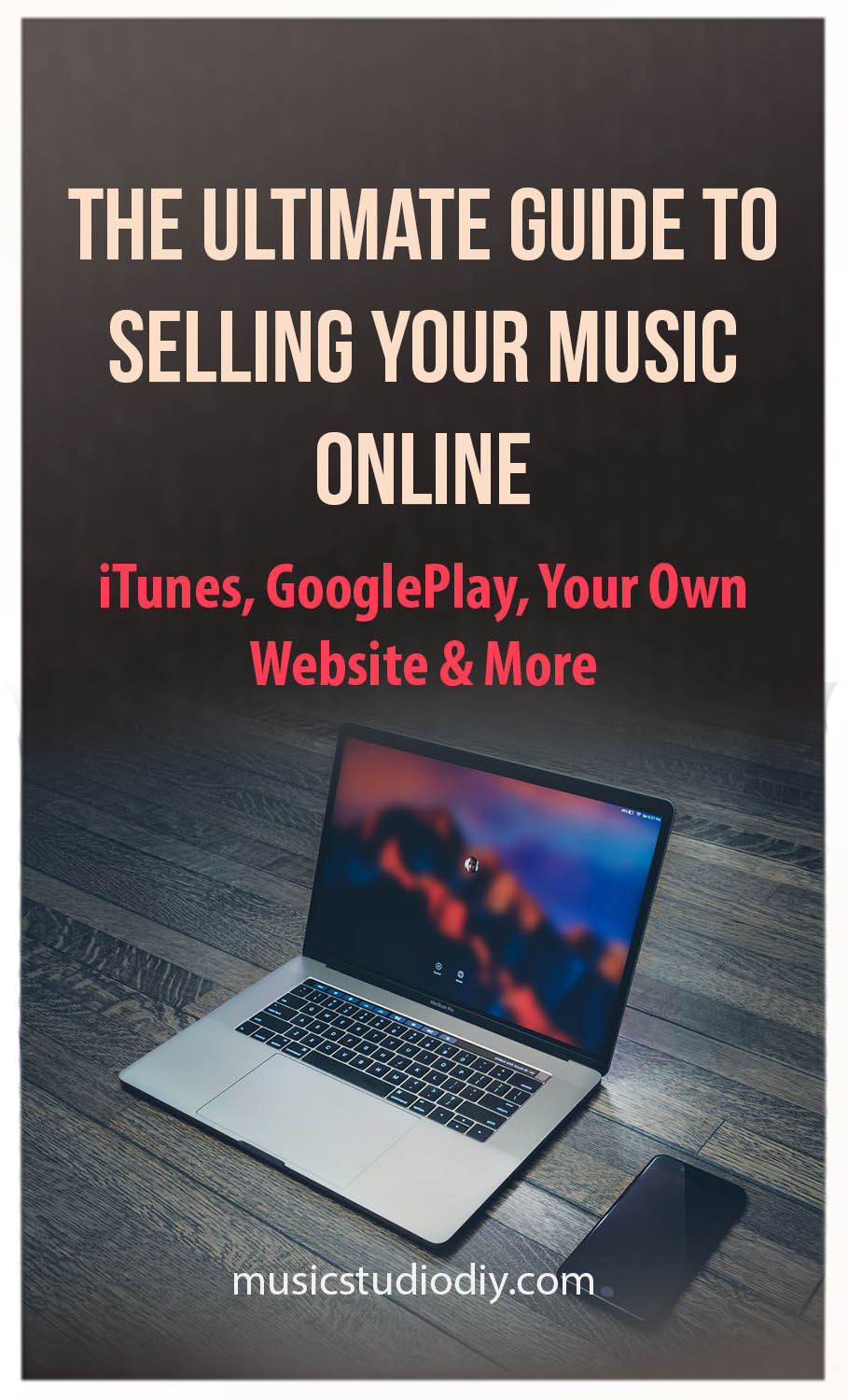 Reaching an audience as a producer or musician has never been easier than now, in this day. Can you believe that a few years back, the one and only way to work your way into the industry and to reach the masses was through big shot record labels? The fate of your career seemed to rest entirely in the hands of other people. But not today. Technology has literally changed so many things about the world and the music industry. Selling your music online, and making a killing on your own is absolutely a thing!
Reaching an audience as a producer or musician has never been easier than now, in this day. Can you believe that a few years back, the one and only way to work your way into the industry and to reach the masses was through big shot record labels? The fate of your career seemed to rest entirely in the hands of other people. But not today. Technology has literally changed so many things about the world and the music industry. Selling your music online, and making a killing on your own is absolutely a thing!
Today, we present to you, The Ultimate Guide to Selling Your Music Online. This article is a comprehensive guideline, showing you the ins and outs of digitally self publishing your music to the web. We provide key information from the beginning to the end process, including promoting and networking strategies. So, if you’ve ever wondered how to successfully get your music up on popular platforms like iTunes, Google Play and Amazon, or even how to release and sell music on your own website, read on.
The Breakdown
This guide is meant to serve as an informative step by step tool to helping you get your music out into the world. The specific aspects we will be taking a look at in this article are as follows:
- Intro: Why Selling Your Music Online is the Ultimate Music Venture
- Step1: What to Prepare Ahead of Time: Technical Formalities
- Step2: Get to Know the Middle Man: Selecting a Music Aggregator (See Our Top 3 Choices)
- Step3: Developing a Personal Website to Market Your Music
- Step4: Promoting and Networking for Musicians and Producers
Why Selling Your Music Online is the Ultimate Music Venture
The World Wide Web has turned what once seemed to be vast and endless world, into a smaller global community within range. Choosing to take the digital and independent route with music is a highly rewarding venture for precisely this reason. The following are the major advantages of marketing your music online:
Wider Reach
Digital marketing of your music enables you to reach a wider global audience simultaneously, without having to leave your location. Traditional music industry methods for working your way in, often resulted in a concentration of popularity in one a or few geographic areas. For instance, reaching mainstream success specifically in the US or UK. Selling your music online gives you a wider reach.
Profits
 If you are the sole composer and producer of your music, virtually all the profits go to you. There would be no major labels, managers and whoever in between who would see the fruits of your labor before you do. Selling your music online allows you to see the bulk of your profits, contrary to the traditional music industry workings.
If you are the sole composer and producer of your music, virtually all the profits go to you. There would be no major labels, managers and whoever in between who would see the fruits of your labor before you do. Selling your music online allows you to see the bulk of your profits, contrary to the traditional music industry workings.
Digital is Where the Money Is
The fact of the matter is large volumes of people are on the internet. People want to consume what’s readily available to them, and a lot the time that is on the very internet we know and love.
Combating Piracy
So look. It’s kind of inevitable. Some people are going to opt for not so great ways to get their music. However, we already know that millions and millions of people do congregate within the hubs of iTunes, Google Play and Amazon. This means that we readily have a large gathering of people prepared to spend their money on music. Selling your music within these platforms provides a guaranteed opportunity to get paid for your work.
How to Start Selling Your Music Online
Now that we understand the benefits of marketing your music online. Let’s get down to the actual how to.Here’s our informative guide on how to sell your music online. Let’s begin, shall we?
Step 1: What to Prepare Ahead of Time
There are few formalities you need to cover before actually getting to selling your music online. These are simple technical aspects that make the further steps to digitally marketing your music a lot easier.
1. Prepare Artwork for your Music
Having artwork to accompany your music is a really important and unavoidable factor when it comes to publishing your music online. You cannot publish your music without any album cover art. And having good high quality artwork for your music enhances your selling prospects all the more. Remember that this is what your prospective listeners and fans will remember you by. So don’t take the issue of developing good album cover artwork too lightly.
FIND A GOOD GRAPHIC DESIGNER
 This is way more simple than you may think at first. Unless you really have your own spectacular graphic design skills, it is really advisable that you get this done by someone who is decently skilled. Your album artwork is literally that eye-catching aspect that you will be remembered by when people come across your music online. It’s not only key to have a memorable visual element, but also one that looks professional and represents you as brand in a professional light.
This is way more simple than you may think at first. Unless you really have your own spectacular graphic design skills, it is really advisable that you get this done by someone who is decently skilled. Your album artwork is literally that eye-catching aspect that you will be remembered by when people come across your music online. It’s not only key to have a memorable visual element, but also one that looks professional and represents you as brand in a professional light.
There are many great platforms around the web that provide great graphic design services at a cost that suits your needs. Some examples of these would be platforms like Fiverr or PeoplePerHour amongst several others. Fiverr is great because you’d really find something that suits a smaller budget if your limited in that sense. So be sure to look around the net for reliable platforms to get your artwork done.
ENSURE YOUR ARTWORK HAS THE CORRECT DIMENSIONS
The various digital platforms you may consider for the publication of your music will have different dimension requirements for your album cover art.
For specific dimensions concerning Spotify, iTunes & Apple Music, Amazon and more, check out this article on the Image Size Guide for Major Music Platforms. For image dimensions regarding GooglePlay, have a look at this Guideline on Album Images for GooglePlay.
Be sure that your images are of high quality. Also ensure that they don’t contain any website address or social media handles and so on.
Please make sure you read on to the further section in this article about Selecting a Music Aggregator. Aggregators tend to have their own standard requirement when it comes to sizes.
2. Prepare the Correct Music File Format for Uploading
The next major factor to prepare for selling your music online, is having the correct audio file format. Platforms like iTunes, Amazon, GooglePlay etc. all have a specific requirement in terms of file formats when uploading your music to their sites. The specifications for these platforms are as follows:
iTUNES, GOOGLE PLAY, SPOTIFY, AMAZON AND OTHER DIGITAL STORES
16-bit/44.1k WAV files
A lot of these online stores do accommodate other file formats which you may have to look further into. However WAV format is the optimal format to upload with because it is known to produce the best audio quality. It also universally accepted across all digital stores for selling your music online, and also accepted by virtually all music aggregators.
While this is the recommended standard that absolutely works for all major online stores, feel free to look at additional file formats if you wish. Also check out this piece on specifically creating a special Mastered for iTunes version if you’d like.
SOUNDCLOUD AND BANDCAMP
24-bit WAV files. Also sample rates higher than 44.1K
This is not totally necessary, but worthwhile if the these specifications are available after mastering. The Soundcloud and Bandcamp platforms accommodate 24-bit, as well as sample rates above 44.1k. These specs could potentially enhance the sound quality when ultimately compressed to the form of MP3. Note that you can always stick to the original 16-bit standard as indicated above.
Step 2: Selecting a Music Aggregator
Now that we have the initial formalities worked out, let’s move on to the next phase of your digital music marketing. You’re probably wondering exactly how to sell your music on iTunes and other platforms. To do this, we need to take a good look at Music Aggregators: What they are, and How to select one to work with.
So, What is an Aggregator?
 The reality is, you cannot simply upload your music directly to platforms like iTunes, Spotify, GooglePlay etc.
The reality is, you cannot simply upload your music directly to platforms like iTunes, Spotify, GooglePlay etc.
Aggregators essentially act as the necessary middle-man between you as the music creator, and a virtually every online music store and streaming service in which you would like to publish your music. Music Aggregators perform the function of global distributors to each of the digital platforms onto which you’d like to sell your music. So basically, you upload your music into an aggregator’s website, go through their publication steps and, thereafter, have your music published to all the major online music stores and streaming services you’d like.
There’s no other way around an aggregator if you’d like to get your songs out there on major online platforms. So the next best thing to do is to decide which aggregator would be best for you.
How to Choose a Music Aggregator
There are a wide number of music aggregators available that each have their own style of pricing methods. While for every individual, the choice of aggregator for selling your music online will differ, we will provide a few recommendations below. We will also provide a basic guideline as far as what the pros and cons of each are concerned.
But before we dive into that, let’s first take a look at what aspects you want to look out for when choosing an aggregator.
Aspects to Look Out For when Selecting an Aggregator

-
-
Fee Plan:
What exactly is the fee structure of the aggregator like? Some companies offer an annual payment plan which is once off and the only fee you pay for the year. (This is often the best structure to go for honestly). Others may offer a monthly fee. And if you’re really on a budget and can’t make a total annual fee, some aggregators charge by taking a small percentage of each sale you make per song. It’s really important to have a look at this before signing up.
-
-
-
Terms and Conditions:
Making sure you understand the terms of service is crucial to selling you music online. You want to make sure that you maintain consistency by understanding the duration of the contract. Also take a good look at what additional fees may possibly be charged. (For instance, some aggregators charge an overall annually/monthly fee, but also charge a fee per album or song release etc). Basically, leaving no room for surprizes.
-
-
-
Music Rights:
Understand the acknowledgment structures of your aggregator. Is the song a cover song? In which case the original artist also receives a portion of your profits. Some aggregators only accommodate original music, so look out for this. Also be on the look out for aggregators who may ask you to forfeit your performance rights once you publish your music through them.
-
-
-
Online Service Providers:
Does the aggregator you have chosen actually publish your music to the digital stores you would like your music to be released to? For instance, if you create your music, does your chosen aggregator actually publish to Spotify or iTunes if that is where wish to publish?
-
-
-
Service Delivery Times:
How long does it take for a particular aggregator to release your music and make it available for purchase. Some aggregators (depending on your payment option) may even offer a pre-order option, so your supporters can make a purchase before release. This gives you time to hype up your release if you so wish.
-
-
-
Submission Criteria:
Some online music stores do not accept all music. Especially when it comes to genre, style and quality. Some platforms are really known for screening music before it is released. These include Beatport and Juno for example. Just make sure you’re aware of the guidelines upfront.
-
Our Top 3 Choices for Music Aggregators
So as we’ve learned at this point, digital music aggregators are an intrinsic part of marketing your music online. We’ve also covered what the key aspects to look out are when choosing an aggregator. Now in this section, we’ll look at our top 3 choices of aggregators for selling your music online. Our selected choices do incorporate the right criteria based on our guidelines above, but it is important to do your own further research into your aggregator of choice. So here’s our top 3:
1. Distrokid
 The first choice on this list is Distrokid. And Distrokid comes first for a number of reasons. In comparison to other popular choices for music aggregators, Distrokid is by far the most cost efficient, while still maintaining an awesome quality service. This company services your music to all major digital stores as well as streaming services. These include iTunes, GooglePlay, Amazon, Spotify, Pandora, Deezer and over 150 other online music stores and streaming services.
The first choice on this list is Distrokid. And Distrokid comes first for a number of reasons. In comparison to other popular choices for music aggregators, Distrokid is by far the most cost efficient, while still maintaining an awesome quality service. This company services your music to all major digital stores as well as streaming services. These include iTunes, GooglePlay, Amazon, Spotify, Pandora, Deezer and over 150 other online music stores and streaming services.
What does Distrokid offer?
-
- For $19.99 per year, Distrokid enables you to publish an unlimited number of songs and albums. This is truly great because other services out there charge you for every album or song upload. There are endless opportunities for one small fee using Distrokid. You also get to keep 100% of your royalties. They don’t take a dime. There are higher pricing tiers for added features, but this is really a good place to start.
-
- Some of the other great benefits of Distrokid is the speedy delivery time. This service releases your music within two to three days. Other well known aggregators usually take about a week to release. So if you’re pressed for time, that’s an advantage.
-
- Another major advantage of Distrokid, is that within the service you able to automatically share royalties to another or several persons. This really lessens the hassle of having to manually split payments every time a sale is made or at the end of every month. Distrokid makes selling your music online that much easier.
-
- For a dollar extra, Distrokid enables you to have your music recognised by Shazam, Siri etc. Which is great way to garner new fans if they just so happen to hear your music. They also offer a Legacy option, allowing you to have your music up on all streaming platforms forever, basically. Even if you stop paying distrokid.
2. Tunecore
 This is another extremely popular choice with one of the largest user bases out there. Tunecore offers a high quality service, having garnered over a Billion Dollars in total revenue of their user base. While Tunecore is arguably a high end service with a plethora of customers to its credit, one of the possible downers for many potential users is the much higher and repetitive pricing structure.
This is another extremely popular choice with one of the largest user bases out there. Tunecore offers a high quality service, having garnered over a Billion Dollars in total revenue of their user base. While Tunecore is arguably a high end service with a plethora of customers to its credit, one of the possible downers for many potential users is the much higher and repetitive pricing structure.
What does Tunecore Offer?
-
- Tunecore offers $29.99 of per album release for there first year. And thereafter, it increases to $49.99 to renew the album for every year. This is significantly more than Distrokid’s once-off per annum payment plan.
-
- The delivery time is relatively slow. It takes between 1 week to 30 Days to have your music show up on all streaming and sales services. So if selling your music online is meant to be a speedy process for you, here’s a key aspect to keep in mind.
-
- Tunecore does not offer an automated royalty sharing function. This could be a problem if you’ve got many people to pay every month (e.g. songwriters, features artist etc).
-
- Tunecores analytics and reports interface is a lot more advanced and well constructed. You do get to collect much more data and stats if all these nitty gritty elements are essential to you. Both Distrokid and Tunecore do offer efficient security (no theft) for music within the platforms. Tunecore also services all major online stores and streaming services.
3. Soundrop
If you’re looking to distribute your music for free, meaning no startup cost like our previous examples, Soundrop is a great tool to make use of. Soundrop gives you the benefit of no hefty fees to publish your music when starting out. Instead, this program only takes a small percentage of your sales and streaming revenue, when you earn something.
What Does Soundrop Offer?
-
- Sound takes 15% of all sales and streaming revenue when it is earned. They do not charge for utilizing the platform up front. This makes it great for if you’re strapped for cash but want to start selling your music online.
-
- Soundrop distributes music to Youtube Music, Spotify, Itunes, GooglePlay, Deezer, Pandora and Apple Music
-
- A payee split service that allows you to automatically share royalties with several rights owners. Again, this simplifies having to pay every individual manually.
-
- Get paid when your balance reaches the minimum threshold of $20 (USD)
Step 3: Market your Music on Your Own Website

Another great avenue that you may be considering for selling your music online, is your very own website. In addition online stores and streaming services, you may feel that having your music available on your website is another great way to earn cash.
While it is true that selling your music on your website will help you sidestep commissions/fees you’d have to pay to aggregators (and some platforms like iTunes also take their cut). You would still pay a minor fees to certain services like PayPal who handle your money, as well some services that host your music files etc.
Things to Note About Selling Your Music on Your Own Website
Before we dive into the details about setting up a website or a page to start selling your music online, here’s a few aspects to bear in mind first:
-
Remember Where the Large Gatherings Are
When people discover your music anywhere, be it on YouTube or radio or anywhere really, they are much more likely to hunt you down on popular streaming services and online stores like iTunes or Spotify. They would not necessarily go specifically looking for your website. In most cases at least. For this reason, you want sell music on your website in addition to mainstream stores as opposed to exclusively. Now this brings us to the next point.
-
Create a Unique or Interesting Reason to Draw People to Your Site
Because of the reason stated previously, think about why people would have to go to your website to buy music, as opposed to GooglePlay Music or Apple Music etc. Create a some unique element like a few exclusive songs that aren’t available anywhere else. Or, alternatively, the opportunity to also purchase merchandise in your store, or even a free song or two for download.
-
The Benefits of Selling Your Music on Your Own Website
Don’t think you’re being discouraged from selling your music on your own website by any means. There are many major perks that come with marketing your music on your own platform. Perhaps the greatest one of all being that you keep close to 100% of the revenue without paying any aggregators or stores any service fees or anything of the sort. It’s also a great way to build a sense of community with your fans by having a special platform on which they can keep up with you and find exclusive information or music.
-
The Cons: Maintenance
Selling your music through aggregators means that virtually the entire process is automated. There is very little upkeep on your part besides payments. Running your own digital store, however, is something that is entirely your responsibility. You have to make sure that your site is functioning smoothly and as it should.
How to Sell Music on Your Own Website
So let’s get straight into it. In this particular section, we’re going to cover specifically how to set up a web page on your website onto which you will be making your music available for purchase. To get started, there are three major facets that form part of the marketing process.
The 3 Fundamental Aspects of Selling Your Music on Your Own Website
-
- Firstly, you need to have a website set up. Here, we’re looking at creating an additional page that you’ll add to your site for selling your music online.
-
- You going to need a method of receiving payments, which we’ll cover shortly.
-
- Thirdly, you will need a method of storing the music files on your website. You’ll then need a way to make the music available to the customer after the purchase is made.
1. Developing a Website for You and Your Music
If you don’t already have a website put together, well, you’re definitely going to need one to achieve this goal. We are not going to delve into the exact mechanics of building a website for yourself as a musician/music producer and such. But know that there are a number wonderful hosting companies, such as GoDaddy, as well as HostBaby. Both of these hosting platforms provide extremely simple, yet powerful website building tools to help you set up a store within your website, especially for musicians.
-
GoDaddy’s GoCentral Webstore Creator
GoDaddy (GoDaddy.com) offers an awesome and highly intuitive site building functionality for musicians and producers. GoCentral enables you to create and setup a website, specifically tailored for musicians, and also allows digital downloads (music files) on the site. This is great for if you’re in not looking to get into the technical nitty gritty of developing a website. This allows you to dive back into your music making, with a professional digital store in tow. GoDaddy hosting offers unlimited bandwidth, meaning a score of potential customers are able to download large files at a time. They offer a number of pricing tiers, but $20(USD) per month gives you a fully functioning online store with GoDaddy’s GoCentral site builder.
This is honestly a great choice for musicians as there are many awesome templates and customisation features available to create a great and professional website and store that represents your brand.
-
HostBaby for Selling Music and Merch
HostBaby is a really awesome platform, tailored for the specific needs of musicians who need a website. It offers the ability to make music and merch available digitally for sale. You can create a products page for selling your music online, and allow visitors to make purchases using PayPal. HostBaby offers unlimited bandwidth for around $20 (USD) per month.
Again, this is a great and simple option for setting up a store in which your fans can purchase music without the technical hassle of manually setting the intricate functionality of your site.
-
Pros and Cons of Creating a Site/Page via these platforms
Essentially, the major benefit of using the previously mentioned platforms, is that they enable you to easily create a store page with full buying functionalities in less than an hour. The notable downs side (for some, at least) is that you would have to pay the price using these platforms. Which somewhat counters what we stated earlier about saving money when selling on your own website. But fret not, there is still a away around this for selling your music online, although more complex.
2. Have a method of Receiving Payments
Now, this step as well as the next point would automatically be covered if you choose to develop a store using hosting platforms like GoDaddy or Hostbaby. If you want to skip the costs of doing so, you’re going to have to manually implement a method of accepting payments into your website. Paypal is a relatively popular option in this regard. Paypal is great because scores of people already make use of it to make payments online. You can alternatively, or additionally make use of the many plugins on WordPress that enable you to accept online credit card payments as well.
Do note that Paypal does take a small commission fee for operation. A great alternative to Paypal that does not take any portion of your earnings is Google Pay (https://pay.google.com/about/business/). This is a great choice if you’re looking to maximise your profits.
3. Storing and Delivering of files Once Purchased
Again, if you’re choosing not go the HostBaby of GoDaddy route for developing an online store, this is an inevitable step you’re going to have to implement. The next facet of selling your music online via your own website is, of course, where your files will be stored. Thereafter, how your music files will be delivered to your customer.
Essentially, there needs to a middleman of sorts that will link a payment with the intended product. This “middleman” would need to ensure that every individual who makes a purchase, receives a music file (MP3) in exchange. You need a service that will enable you to upload your music, make it a product for purchase and then enabling you to insert a “buy” link into your website.
Available Services for Hosting/Delivering Files
There are several services out there that can do this for you. These platforms will organise the transaction of the money with the online payment service (i.e. PapPal, Google Pay or Credit Card). Once the transaction is verified and the money is received, your customer will receive a download link via email so they can access the digital purchase.
Platforms that you can use in order to do this include Payloadz (www.payloadz.com), as well as E-junkie (www.e-junkie.com).
Payloadz
Payloadz essentially enables you to upload files to their platform. You can then apply a “buy” link from them on your website enabling your customers to make a purchase as described above. Alternatively, you could choose to host the music files on your own website, if you don’t mind people utilizing your bandwidth upon downloading. Both HostBaby and GoDaddy offer unlimited bandwidth so it shouldn’t be an issue. Payloadz accommodates both Papyal (standard account for large payments as well as an account for micropayments) and Google Pay. Learn more about Payloads here on www.payloadz.com .
E-Junkie
E-Junkie is a very similar service to Payloadz for selling your music online. They have the benefit of a much smaller commission rate in comparison. E-Junkie pretty much functions in the same way as far as transactions. They also support Google Pay as well as PayPal, although the micropayments option is currently not available. Learn more about E-Junkie here on www.e-junkie.com
Step 4: Promoting Your Music and Networking

We’re not going to dive all that deeply into this topic in this particular article (but do look out for our in-depth article on promoting and networking for musicians). However, this step is an absolute given. Once you’ve made your music available at all the various purchase points we’ve discussed, the natural next step for selling your music online is Promoting, Promoting, Promoting.
People need to know about you and your music. So it is absolutely key to make yourself as discoverable as possible using various platforms and techniques. Aspects to bear in mind include the following:
Social Media for Musicians and Music Producers
Social Media is a ubiquitous part of this day and age. Many of your prospective fans are on various social media platforms including Instagram, Facebook, Twitter etc. etc. Be sure to avail yourself on all the platforms you’re able to manage. This is a great way to keep in touch with your listeners and vice versa, and provide them with any necessary updates and new music releases.
Collaborate with Other Musicians
Another great way to get your name and music out there is by networking with other producers and musicians that you can work with. Being featured on somebody else’s track, means that an untapped audience can become aware of you. Don’t isolate yourself as a musician. Try to reach out to people whose music you feel like can complement yours and see what you can produce together.
Create Awesome Content on Your Website
It’s a great idea to have a blog section within your website that you update from time to time. Having good content that your fans are likely to share through their social media platforms is a great strategy to expand your reach. Come up with great blog posts notifying your readers about your latest projects, shows interviews and the like. Good, sharable content goes a long way.
Add a Mailing List to Your Website for Marketing Your Music
Another great method for promoting and selling your music online is through mailing lists. Have a function that allows your fans to subscribe to you for updates and such. Having a mailing list is a great way to market new music that you have ready for release. You can even create a hype by enabling exclusive pre-orders to those who have subscribed.
Conclusion
That’s it for our guide to selling your music online. Digital Marketing for musicians and producers is a massive means through which you can reach the world at your fingertips. So get your music out there on iTunes, Spotify, Amazon Music and as many outlets as your can think of for success. Hopefully you’ve picked up great information to help you get started with marketing your music online.
For more guides on working in your home music studio as a musician/music producer, check out these great resources:
- The Best Ways to Improve Home Music Studio Productivity and Workflow
- 60 Tips for the Best Home Music Production
